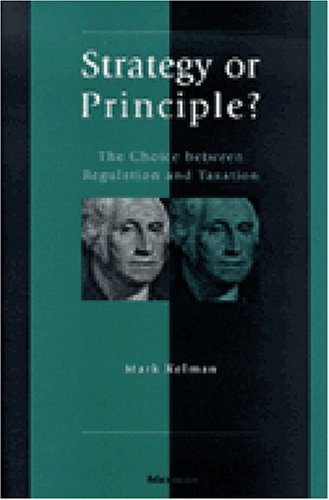Verwandte Artikel zu Strategy or Principle?: The Choice Between Regulation...

Inhaltsangabe
Governments may choose to meet perceived social problems either through regulatory mandates or the public provision of a good that is funded by broad-based taxes. Contrary to an emerging conservative consensus in the "property rights" movement, Strategy or Principle? argues, first, that the constitution permits broad use of regulations and, second, that the use of regulation may be the better policy choice.
Strategy or Principle? addresses a critical issue in law, public administration, and public finance: When is it both prudent and constitutionally permissible to meet social aims by requiring that private parties take certain steps to meet that aim? Alternately, when is it appropriate for the government to use the money it raises through general taxation to fund programs that meet these aims?
Regulations have been criticized in "property rights" literature on the grounds that it violates the constitution by limiting the ability of property owners to use their property without compensation. These theorists argue that the government must directly fund these programs. Kelman argues for regulations and "regulatory taxes" in some situations. However, he criticizes an undue reliance among certain political progressives on regulation, arguing that the allocation of social benefits may be irrational if those who are benefited by regulation are thought to have some sort of moral priority to the money implicitly spent on improving their condition over those who receive funds through tax-and-spend programs.
Strategy or Principle? will be of interest to students and scholars of constitutional law, public finance, political science, and legislation and administration.
Mark Kelman is William Nelson Cromwell Professor of Law, Stanford University Law School.
Die Inhaltsangabe kann sich auf eine andere Ausgabe dieses Titels beziehen.
Über die Autorin bzw. den Autor
Mark Kelman is William Nelson Cromwell Professor of Law, Stanford University Law School.
„Über diesen Titel“ kann sich auf eine andere Ausgabe dieses Titels beziehen.
EUR 16,21 für den Versand von Vereinigtes Königreich nach Deutschland
Versandziele, Kosten & DauerNeu kaufen
Diesen Artikel anzeigenGratis für den Versand innerhalb von/der Deutschland
Versandziele, Kosten & DauerSuchergebnisse für Strategy or Principle?: The Choice Between Regulation...
Strategy or Principle? The Choice Between Regulation and Taxation
Anbieter: BookAddiction (IOBA, IBooknet), Canterbury, Vereinigtes Königreich
Hardcover. Zustand: As New. Zustand des Schutzumschlags: As New. 144pp. In as new condition throughout - still in publisher's shrink-wrap. Addresses the critical issue in law, public administration and public finance: When is it both wise and constitutionally acceptable to meet social aims by requiring that private parties take certain steps to meet that aim?'. Bestandsnummer des Verkäufers 007186
Anzahl: 1 verfügbar
Kelman, M: Strategy or Principle?
Anbieter: moluna, Greven, Deutschland
Gebunden. Zustand: New. KlappentextrnrnShould governments use regulations to force private parties to provide public goods or should taxes support the direct provision of public services? Bestandsnummer des Verkäufers 594709213
Anzahl: Mehr als 20 verfügbar
Strategy or Principle?: The Choice Between Regulation and Taxation
Anbieter: Kennys Bookshop and Art Galleries Ltd., Galway, GY, Irland
Zustand: New. Should governments use regulations to force private parties to provide public goods or should taxes support the direct provision of public services? Num Pages: 144 pages. BIC Classification: KCP; KFFD1. Category: (P) Professional & Vocational. Dimension: 230 x 159 x 23. Weight in Grams: 375. . 1999. Hardcover. . . . . Bestandsnummer des Verkäufers V9780472110476
Anzahl: 15 verfügbar
Strategy or Principle? Format: Hardcover
Anbieter: INDOO, Avenel, NJ, USA
Zustand: New. Brand New. Bestandsnummer des Verkäufers 9780472110476
Anzahl: Mehr als 20 verfügbar
Strategy or Principle?: The Choice Between Regulation and Taxation
Anbieter: Kennys Bookstore, Olney, MD, USA
Zustand: New. Should governments use regulations to force private parties to provide public goods or should taxes support the direct provision of public services? Num Pages: 144 pages. BIC Classification: KCP; KFFD1. Category: (P) Professional & Vocational. Dimension: 230 x 159 x 23. Weight in Grams: 375. . 1999. Hardcover. . . . . Books ship from the US and Ireland. Bestandsnummer des Verkäufers V9780472110476
Anzahl: 15 verfügbar
